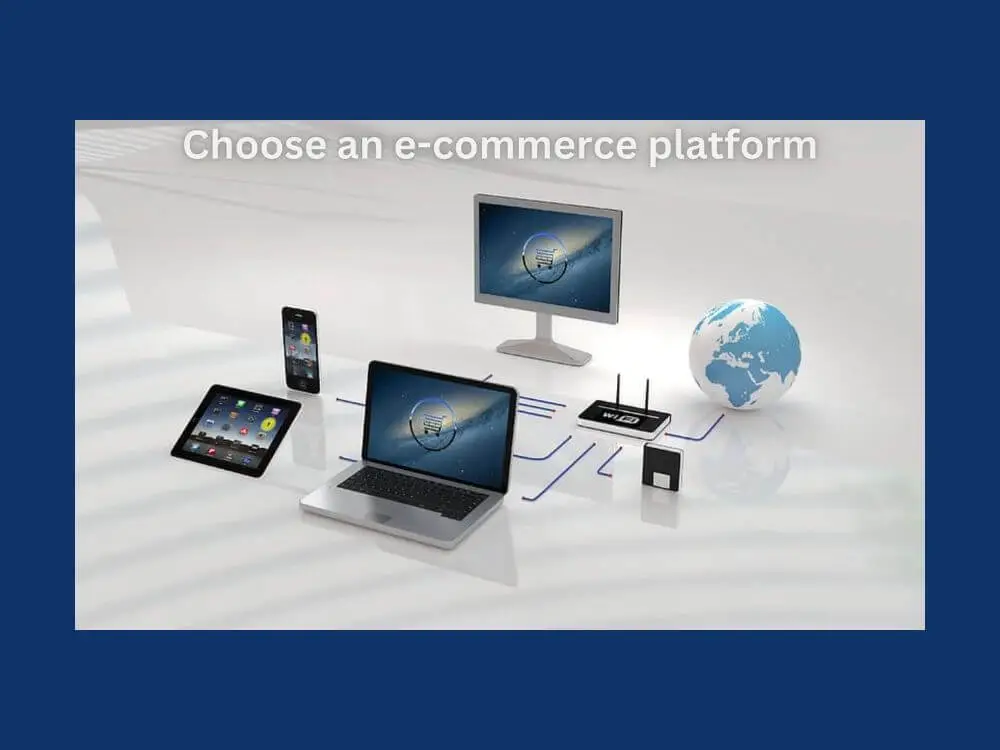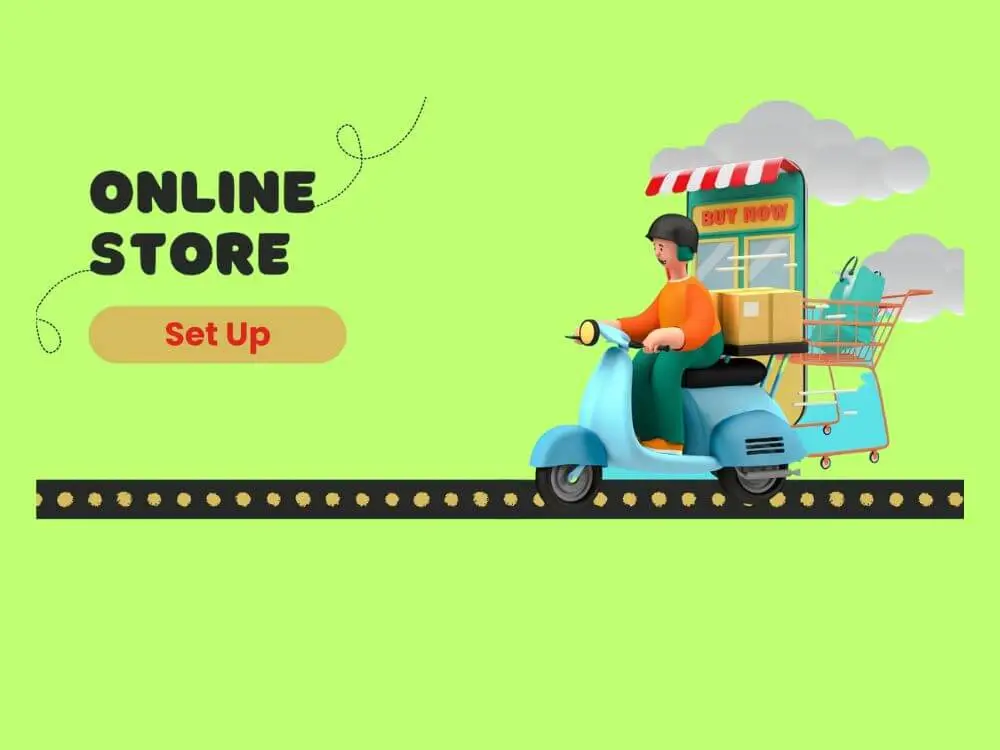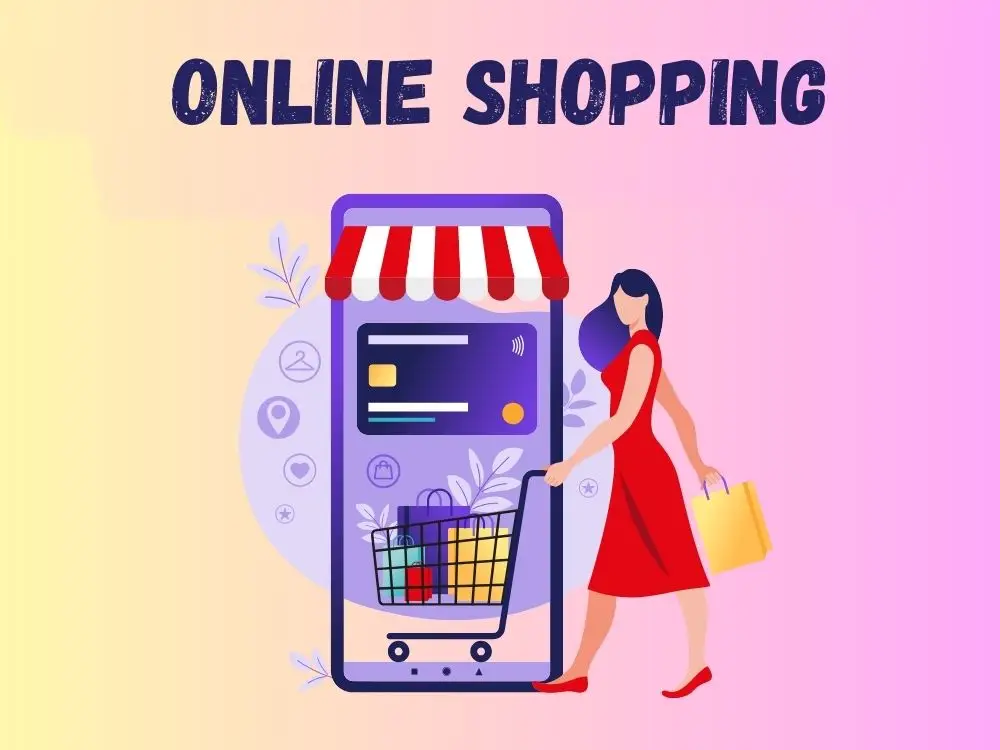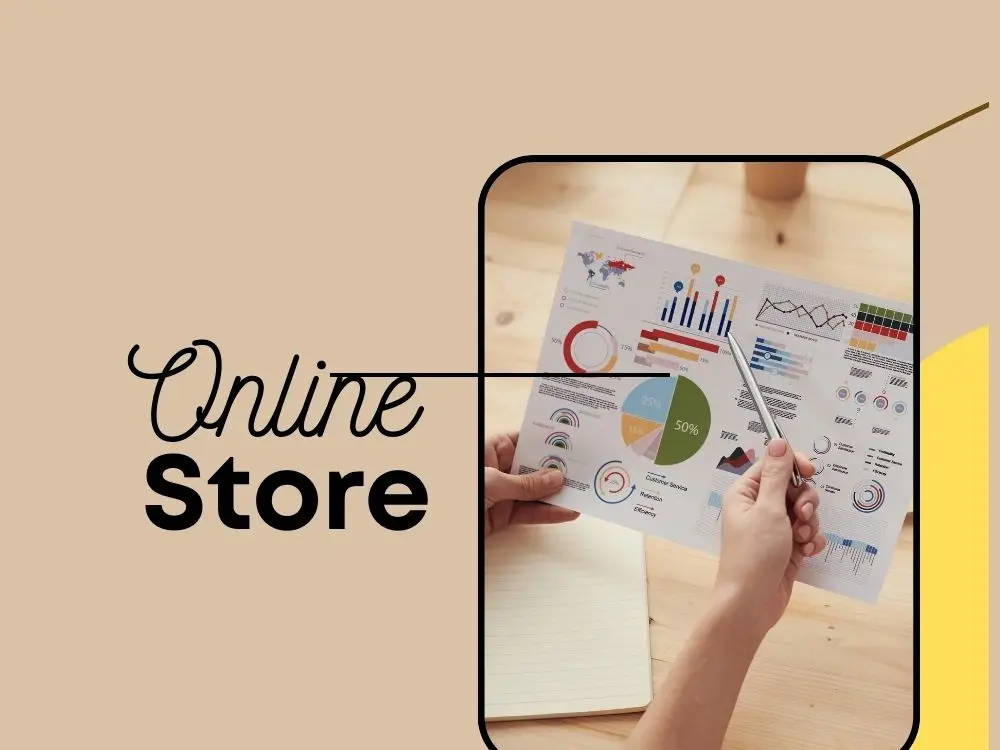
Start Your E-Commerce Journey Today: A Complete Guide to Building Your Own Online Store
Are you thriving in the competitive markets today? The retail environment has completely changed because most of the buying has shifted online. People now prefer to buy things from home without having to travel to a store. An organization that doesn't have an e-commerce store becomes totally insignificant and misses several opportunities to grow.
As more people embrace online shopping, businesses must perceive the importance of having an online store. So they can engage and acquire most of their target customers online. Additionally, having an online store provides invaluable insights into customer behaviors and purchasing trends.
Key Takeaways
- A road map to a successful e-commerce store online by deciding what products or services to sell, including identifying the niche and conducting proper market research.
- Choosing highly demanded products that go well or convert
- Comparing different available e-commerce platforms
- Factors to consider when choosing a platform
- How to choose a domain name correctly, create a logo, and branding for the online store
- Building the e-commerce website and designing various product pages.
- Choosing the correct payment options to make the transactions, setting up shipping options, managing the orders, and tracking shipments.
- The proper way to do SEO optimization for the website, social media marketing, and email marketing
- Website traffic and sales tracking, monitoring the data, and finally improving customer experience and satisfaction.
Decide What to Sell

A) Conducting Market Research
This is a crucial step in starting an e-commerce store. It provides valuable insights and ideas about the current trends and demands of the market. Plus, it's helpful to tailor your offerings to match the needs of your target customers.
By studying your competitors, you can easily identify market gaps and areas where you should differentiate yourself from others. Further, market research helps you identify the best marketing channels and optimize pricing strategies. This helps reach and appeal to your audience effectively.
Overall, investing the time and resources in the market research process can significantly increase the chances of your e-commerce store's success.
B) Identifying a Niche
The first and pivotal step to launching a successful e-commerce store lies in distinct niche identification. Without a targeted and specific niche, it's almost impossible to stand out in a crowded online marketplace.
A niche means a specialized product or service category that a specific set of audiences is interested in. Selecting a niche that aligns with the passions and expertise of your e-commerce business is highly important.
Moreover, undertaking comprehensive market research enables you to gauge the potential size of your target customers and assess the competitive market. Upon identifying your niche, it will then become imperative to set up your e-commerce store. Plus, distinguish your product/service from others by presenting unique value propositions.
This helps manifest exceptional customer service, flawless and quality products, competitive pricing, or a combination of them. By diligently selecting a niche and presenting compelling value propositions, your online store can establish itself as the go-to destination for your discerning target audience.
If you're finding it difficult to choose a niche, another practical option is to acquire an established business. In countries like Australia, many entrepreneurs explore opportunities such as buying a business. Acquiring an existing physical store with plans to take it online. The same approach is gaining traction globally, including in the US, where transforming brick-and-mortar stores into e-commerce ventures is a growing trend.
C) Choosing Products to Sell
Before deciding which products to sell, it's crucial to research and identify profitable niches and current market trends. Equally important is understanding your target audience, as this plays a key role in making informed product selections.
If you are starting your e-commerce store, you just want to offer products that are in high demand, yet unique and differentiated from competitors. Additionally, consider the factors such as production costs, packaging, shipping, and storage to ensure profitability.
It's also necessary to keep a balance between offering a diverse range of products and keeping inventory manageable. Remember to keep in mind that the success of your e-commerce store heavily depends on the products you choose to sell.
Choose a Platform

A) Comparison of Different E-Commerce Platforms
Choosing the right e-commerce platform is a complex task when you are starting an online store. With many options available, each possesses its advantages and disadvantages. So, you have to decide with careful consideration.
Among the popular choices are Shopify, WooCommerce, or a Magento platform. Shopify is widely recognized for its user-friendly interface and extensive app store, offering a seamless experience. WooCommerce is another favorite option for those who are already familiar with WordPress to leverage its integration capabilities.
Meanwhile, Magento stands out as a robust and highly customizable solution, but it may require a higher level of technical expertise. Ultimately, selecting the optimal platform for your e-commerce store depends on your unique requirements and aspirations.
B) Factors to Consider When Choosing a Platform
Selecting the right e-commerce platform for your online store entails careful consideration of various vital factors. This directly impacts the success of your online business. First, it's important to think about the scalability and flexibility of the platform. So that the chosen platform can guarantee the growth trajectory of your enterprise.
Also, it's equally important for the selected platform to ensure robust security measures that ensure the handling of sensitive customer data and financial transactions. Another crucial element is the availability of customization options in the platform. This enables the creation of a distinct and unforgettable shopping experience for valued customers.
Further, it's vital to evaluate the level of support and training offered by the particular platform's customer service. Finally, understanding the financial implications is necessary to encompass transaction fees, monthly subscription costs, and other related operational expenses. This makes sure the platform aligns with the financial ability of your e-commerce business.
Set Up Your Online Store

A) Choosing a Domain Name
Choosing the correct domain name for your e-commerce store is one of the most important decisions you will make when starting your e-commerce business. Your domain name is the unique identifier for your brand.
Therefore, you should pay adequate attention to choosing a memorable, short domain. Plus, it should reflect your business perfectly. Ideally, you want to choose a domain name that matches your business name or products. This helps with search engine optimization (SEO) and lets customers find you online easily.
Further, it's better to consider a good extension for your domain. Popular domain extensions are .com, .net, .biz, etc. If you need local or country-specific domains, you can choose that too. However, your domain name is an influential identity of your online brand, and you must take some time to choose one wisely.
B) Creating a Logo and Branding
Establishing a brand identity is important. You can do this by creating a unique logo and branding materials. This holds immense importance when initiating an e-commerce store. To stand out in the competitive market, the logo and brand should be created identically. Also, your logo should be simple and memorable while showcasing your brand's personality and values.
Further, choosing the right color scheme and font choices for the logo with your brand's vision contributes to a cohesive brand identity. Using a logo maker can help you design a professional and distinctive logo that aligns with your brand.
Dedicating enough time and effort to create an eye-catching logo and website favicon is important for brand identity. This significantly enhances your online store's credibility and brings you more sales.
C) Building Your Website
This is an important step in setting up an e-commerce store. It's vital to build your website with all the proper elements and functionality. Plus, your website should be easy to navigate and reflect your brand identity. Moreover, you must consider your target audience and their particular web browsing patterns.
Ask some questions such as,
- Do they prefer a minimalist or more detailed design?
- What are the most essential features of your customers?
Once you have a solid understanding of your customers' preferences, it's important to choose the right eCommerce platform or a good hosting provider to build your website. Famous e-commerce platforms like Shopify and WooCommerce offer several templates and customization options to make the website development process easier.
Also, without relying on an e-commerce platform, you can develop a website for your own with a good and reliable hosting company. If you are just starting out, shared hosting is an excellent, budget-friendly option to launch your e-commerce store.
D) Designing Your Product Pages
After you create your website, it's essential to design the product pages of your online store, which should be clean, easy to navigate, and visually appealing to customers.
It's important to always display high-quality, copyright-free images of your products and provide accurate descriptions and pricing information. Plus, you should compress images to make your website faster, and this is vital for a better customer experience.
Further, you must consider incorporating customer reviews and ratings on your product pages. This helps build trust with potential buyers. Another important element you should consider is the call-to-action button, which should be prominently displayed and motivate visitors to make a purchase.
By taking enough time to design your product pages, you can increase conversion rates and sales. This helps ultimately grow your e-commerce business.
Payment Methods and Shipping Options

A) Choosing a Payment Gateway
Choosing the correct payment gateway for your new e-commerce store holds immense importance and demands careful consideration. The decision to choose it should not be seen lightly, as the success of your online business mostly depends on this choice.
Payment gateways serve as an interface between customers and merchants that facilitate secure transactions. There is an abundance of options available as payment gateways. Choosing the correct one is essential to make the transaction without any problems for both customers and merchants.
The main factors you should consider when selecting the payment gateways for your e-commerce business are:
- The Transaction Fees
- Security Features
- Ease of Integration
- The Range of Payment Methods It Supports
However, common payment gateway options like PayPal or Stripe won’t approve your e-commerce business if they are categorized as high-risk. Therefore, you need a high-risk merchant account for online credit card or debit card transactions at this point. Some well-known organizations, such as HighRiskPay.com, Durango Merchant Services, and SMB Global, offer these merchant accounts to high-risk businesses.
Also, thorough research and comparison of different available payment gateway providers are imperative. Bank transfer and cash on delivery (COD) are traditional methods that may cause some inconveniences.
At the same time, integrating an online card payment (credit/debit card) system is convenient to the customers and helps increase the sales growth percentage. Popular options are Stripe, Payoneer, etc. Also, PayPal, RazorPay, and many other options are available. Nowadays, crypto is also a popular option.
B) Setting Up Shipping Options
This is another crucial step for a smooth checkout process and customer satisfaction. If you are starting an e-commerce store, you just need to carefully choose the shipping methods and pricing that match your products and target audience.
It's vital to consider factors like the product size, weight, shipping times, and shipping rates in your region. You can offer free shipping for a minimum order value to loyal customers, and it can be a great way to incentivize sales and boost customer loyalty.
Lastly, integrating a trustworthy shipping carrier service and a proper tracking system provides transparency and peace of mind to both you and your customers. Therefore, properly setting up your shipping options will not only streamline order fulfillment but also differentiate your brand from competitors.
C) Managing Orders and Tracking Shipments
Managing orders and tracking shipments are crucial for running an e-commerce store. You should ensure that orders are processed in a timely and accurate manner. This will impact customer satisfaction and repeat business.
Implementing an efficient order management system can help streamline the process of collecting, processing, and fulfilling orders while minimizing errors. In addition to that, tracking shipments allows e-commerce store owners and customers to stay up-to-date on the delivery status of packages.
This positively impacts trust and transparency, which are crucial in building a strong brand and keeping customers happy. With the right processes, managing orders and tracking shipments will be a stress-free experience for everyone involved.
Marketing Your Online Store

A) SEO optimization
Search engine optimization (SEO) plays a pivotal role when it comes to growing your e-commerce website. By implementing effective SEO strategies for your website that are adapted to the content and structure of search engines, you will be able to drive more organic traffic to your site and increase sales.
There are different types of SEO. You can start by conducting comprehensive keyword research to identify the terms your target customers are searching for. Adding those keywords to your product descriptions, titles, and blog posts is vital for on-page SEO.
Further, make sure your e-commerce website’s structure is easy to crawl by search engine spiders and indexable. Also, provide useful content and quality products or services to acquire more natural backlinks to your site. Plus, allocate some time to build natural backlinks and improve your domain authority and other important off-page SEO stuff.
Moreover, you should also provide adequate attention to technical SEO. It includes proper navigation, faster loading, a good user interface, etc.
B) Social Media Marketing (SMM)
Social media marketing (SMM) is an essential element when it comes to marketing any e-commerce store. Make engaging content and promote it on different social media platforms such as Facebook, Instagram, Twitter, Reddit, Pinterest, and Snapchat. This way, you can reach a huge audience that actively uses all these social media platforms.
It's so convenient to connect with potential customers with billions of active users on various social media platforms. This will help drive traffic to your online store and make conversions. Social media provides endless possibilities for your e-commerce business to shine.
You should carefully plan your social media marketing strategy to create a strong brand presence and achieve maximum engagement. This will result in increased sales and overall growth of your e-commerce business.
C) Email Marketing
Harnessing the potential of email marketing significantly enhances your e-commerce store's outreach and drives sales. By using effective email marketing strategies, you can get many benefits. Starting from collecting emails from your target audience, you can build your email list comprising individuals who are willing to share their contact information.
Leveraging this list, you can run targeted campaigns that highlight your products and services that grab the audience's attention. By creating compelling subject lines, delivering valuable content, and incorporating a clear call to action, you will be able to inspire your email subscribers to make purchases and foster their loyalty.
When you approach email marketing with the right mindset, it becomes a potent element for nurturing your e-commerce business's growth and accomplishing your marketing objectives.
Analyzing and Improving Your Online Store

A) Tracking Website Traffic and Sales
This allows you to get some insights into your customers' behavior and your website's performance. In addition to that, tracking aids you in identifying necessary areas for improvement and implementing strategies to increase sales and revenue.
Moreover, this can help rectify errors and optimize your e-commerce website as per the targeted marketing campaigns. Utilizing free tools such as Google Analytics will help you track important data like average order value, bounce rates, and conversion rates.
B) Making Changes Based on Data
Embracing data-driven changes holds immense significance for developing your online store. Data serves as an invaluable resource that allows you to discover your customers' behavior, their preferences, and important factors influencing their purchasing decisions.
By harnessing all this data, you can optimize your store according to their requirements and offer an improved user experience. There are essential data metrics that you should track on your website, such as traffic, bounce rate, time on site, click-through rate (CTR), and average order value.
Analyzing these data metrics continuously aids in implementing data-driven adjustments to your online store. This empowers you to remain one step ahead of the competition.
C) Improving Customer Experience
Engaging in customer analysis and making improvements to your online store holds immense importance in enriching your customers' shopping experience. Achieving this is possible by optimizing your website's layout, making it user and mobile-friendly, and easy to navigate.
It's also crucial to ensure that the design of your website aligns with your brand's identity while presenting clear and concise content. The checkout experience plays an important role in influencing customers' purchasing behavior.
Streamlining the payment process and offering multiple payment options can significantly enhance customer satisfaction. By enhancing the features of your online store, customers are more likely to recommend your business to others and become loyal returning customers.
Wrapping Up
As we have discussed in this article, the significance of e-commerce continuously grows. So, establishing your very own e-commerce store with an array of platforms and tools available is easy. By adhering to the tips and guidelines given in this comprehensive article, you can start an online store that yields revenue and propels your business toward growth.
FAQs
Q1: How do I start a small eCommerce business?
To start a small eCommerce business, you must follow these essential steps:
- Identify your niche and conduct market research.
- Choose the products you want to sell.
- Select a suitable eCommerce platform, like Shopify or WooCommerce.
- Create a memorable domain name for your online store.
- Build a user-friendly website with appealing product pages.
- Set up secure payment methods and shipping options.
- Implement digital marketing strategies, including SEO, social media, and email marketing.
- Analyze website traffic and sales data to make improvements for a better customer experience.
Q2: How much does it cost to start an e-commerce business?
There is no fixed cost for starting an e-commerce business. However, there are some key expenses to consider:
- Domain and hosting: It can be around a minimum of $30 per year to more than $1000 for higher-end hosting services such as dedicated servers.
- eCommerce platform: Costs vary, for example, Shopify starts at $29 per month.
- Website development: Depending on your design and features of the website the cost varies, typically from a few hundred to a few thousand dollars.
- Product inventory: This cost depends upon what you are selling and how much stock you need.
- Marketing: Budget for paid advertising and SEO services, This cost can range from a few hundred to several thousand dollars per month.
- Shipping and fulfillment: Costs may vary according to the size and weight of your products and your chosen shipping methods.
Q3: How can I identify the right niche for my e-commerce business?
It involves steps like properly researching your passions, expertise, and current market demand. A successful niche aligns with your interests and caters to a specific audience.
Q4: What are some common challenges faced by small e-commerce businesses, and how can they be overcome?
Common challenges for small e-commerce businesses may include very intense competition, shipping logistics, and digital marketing. Overcoming these challenges requires thorough planning, customer-centric strategies, and ongoing optimization.
Explore Related Posts
https://smarttoolsai.com/post/merchant-fraud-protection
https://smarttoolsai.com/post/offshore-merchant-processing-for-high-risk-businesses
.webp)